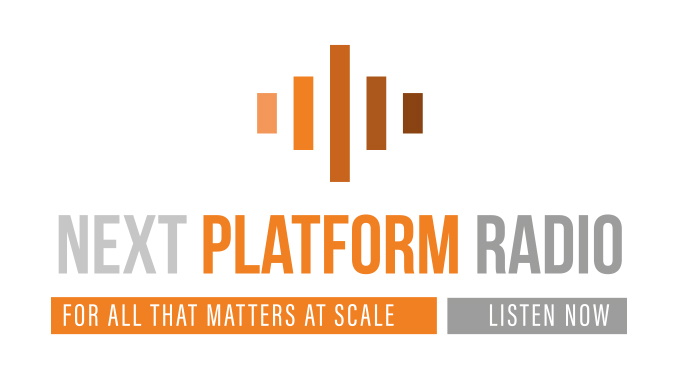
Next Platform Radio for the month of March, 2020.
Join The Next Platform for interviews and analysis around each day’s events. Stay tuned daily for fresh insights from the large-scale infrastructure ecosystem. Covering compute, networking, storage, systems software, interesting use cases, and more. Check here Monday through Friday for new editions. We welcome your feedback on this new feature and suggestions for topics that interest you. Send to host nicole@nextplatform.com
March 16, 2020: The Server Market, What Happens Next? Speeding Drug Discovery Pipelines with Deep Learning
Discussion about the future of the server market. While previous lulls in server activity have been backed by the emergence of big buyers (hyperscalers/cloud builders) the current state of global markets might make things different. We discuss this in some depth. We are also joined in the second half of the program by Dr. Michael McManus to talk about drug discovery pipelines and where deep learning might fit, especially in the wake of COVID-19.
March 10, 2020: FPGAs are a Next Platform; Memory That’s Storage That’s Software; Serverless/Container Trends
For those who haven’t followed these devices closely, you heard it here, FPGAs are changing, they are truly moving toward what we would consider a Next Platform. We explore this in the context of their functions as hybrid compute and network devices first. Later in the program we talk about storage that’s memory and while also storage, is also software. How’s that for a teaser? And later we’ll touch on some serverless and containerization trends at the end of the program.
March 9, 2020: Server Market Movements; Supercomputer’s Role in Coronavirus Treatment; The Remote World
On today’s program we’ll take a dive into the number of two of the leading server makers to get a sense of future infrastructure spending and deployment trends. After that we’ll talk to Dr. Jeremy C. Smith of Oak Ridge National Lab about his team’s work developing a treatment for the cornovirus using the Summit supercomputer at ORNL and molecular dynamics modeling at massive scale. We’ll end with insights about being remote…more on that to come.
March 5, 2020: Analysis of AMD’s Financial Analyst Day; Infrastructure Investment Futures; Big Ol’ Robot Ships
We are dedicating a good bit of the show today to a detailed wrapup of AMD’s financial analyst day because folks, this goes quite a bit beyond financial projections and into roadmap territory. whether you’re someone who buys compute or gets paid to think about the market for it, you’ll want to stay tuned. AMD is definitely back and this vision, well, let’s just say it’s bold.
After our analysis of that with our own Timothy Prickett Morgan we’ll talk about the near future of investments and capital for large-scale compute infrastructure and we’ll close the program with some Titanic-class autonomous news from today that should float your boat.
March 4, 2020: El Capitan Analysis; CPU Only Approaches Neural Networks, More…
A quieter day than usual on the news front save one big item, the announcement of the much anticipated El Capitan supercomputer coming to Lawrence Livermore National Laboratory. We have some analysis on that coming up in a moment.
Later in the program we’ll be talking about CPU-based deep learning training. It’s been an uphill battle for chipmakers like Intel to make the case for CPUs as viable alternatives for training at scale but more work is showing how various optimizations, at least using TensorFlow, can take advantage of higher memory as training systems scale.
March 3, 2020: Honeywell’s Quantum; Black Boxes; Mellanox Acquisition; Ayar Labs in Defense…
On today’s edition, among many other things, we’ll be talking about Honeywell’s announcement that they will be bringing the quote “most powerful quantum computer” end to market. Now, that’s a tricky title to proclaim since it’s not necessarily based on the mainstream metric of quantum achievement, the connected. qubit count. TO get to the heart of this we’ll talk with Tony Uttly, Honeywell’s president of quantum solutions.


Be the first to comment